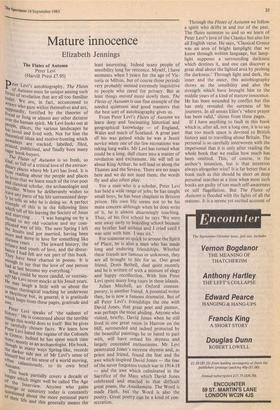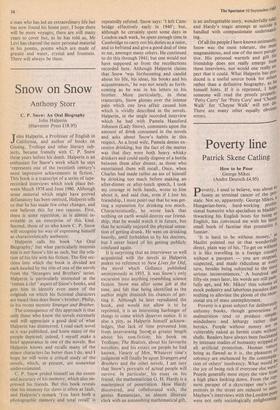Mature innocence
Elizabeth Jennings
The Flutes of Autumn Peter Levi (Harvill Press £7.95)
peter Levi's autobiography, The Flutes of Autumn must be unique among such ;°11ns of revelation that are all too familiar 'oci!ay• We are, in fact, accustomed to WriterS Who gaze within themselves and are, sL14°sedlY, fortified by the theories of v
• reud or
Jung or almost any other dictator over the human spirit. Mr Levi looks out at Dee*, places, the various landscapes he has
loved and lived with. Not for him the theoretical ideas and motive-hunting which nowadays are stacked, labelled, filed, Printed, publicised, and finally bore many eager book-buyers.
The Flutes of Autumn is so fresh, so Kind, so full of a critical love of the extraor- cifinarY places where Mr Levi has lived. It is 'ern reading about the people and places 'Le loves that we learn much of the true poet and classical scholar, the archaeologist and traveller. Where he deliberately wishes to 1,,eakve any parts of his life unexamined deep- / he tells us why he is doing so. A perfect examPle of this is in the following lines Which tell cli .and marryngfhis his the Society of Jesus inread 'I was hanging on by a nH u my old vocation and my com- ti, ot "Led way of life. The next Spring I left 'e Jesuits and got married, having been trnhe.i,r,e and more in love for something like Years . . . The inward history, the -1,'"ancY and youth of love, and the distur- ,ruance I had felt are not part of this book. en hey have been charted in poems. It is L-eIngh to say that the love of one person had at last become my everything.' e,4W_hat could be more candid, or restrain- Air Levi never mocks at his Jesuit years. e loaY laugh a little with us about the • aroun theological teaching he underwent leYthrop but, in general, it is gratitude loh leaps from these pages, gratitude and awe.
tho r peterLevi speaks of 'the sadness of y He is concerned about the terrible lags this world does to itself. But he gives ps carefully chosen facts. We learn how eter Levi hated the regime of the Colonels Greece. Indeed he has spent much time there, mostly as an archaeologist. His book, ik°tIgh in many ways Spring-like, records n ,L!e darker side not of Mr Levi's sense of ont self but of his sense of a world moving, en calamitously, to its own brief Auturnri.
Ihts book partially covers a decade or „nger which might well be called The Age P u_rei the Interview. Anyone who gains ciu stige or notoriety today is constantly orestioned about the more personal parts their life and this generally means the
least interesting. Indeed many people of sensibility long for reticence. Myself, I have moments when I yearn for the age of Vic- toria or Milton, but of course those periods very probably seemed extremely inquisitive to people who cared for privacy. But at least things moved more slowly then. The Flutes of Autumn is one fine example of the needed quietness and good manners that the best sort of autobiography gives us.
From Peter Levi's Flutes of Autumn we learn deep and fascinating historical and geographical knowledge — of England, Wales and much of Scotland. A great part cif his was gained while he was a Jesuit novice when one of the few recreations was taking long walks. Mr Levi has turned what could be a long, dull chore into a matter of revelation and excitement. He will tell us about King Arthur, he will lead us along the Thames and the Severn. There are no maps here and we do not need them; the words fly and also often play.
For a man who is a scholar, Peter Levi has held a wide range of jobs; he has taught small boys, he has been chaplain to Brixton prison. His own life seems not to be his main concern although when he does write of it, he is almost disarmingly touching. Thus, of his first school he says 'We were sent away early to boarding school because my brother had asthma and I cried until I was sent with him. I was six.'
For someone so quick to arouse the Spirit Of Place, he is also a man who has made long and enduring friendships. Whether these friends are famous or unknown, they are all brought to life for us. One great friend, Denis Bethel], died quite recently and he is written of with a mixture of elegy and happy recollection. With him Peter Levi spent many long tours in these islands.
Julian Mitchell, an Oxford contem- porary, is another friend. A potential writer then, he is now a famous dramatist. But of all Peter Levi's friendships the one with David Jones, that great poet and painter, was perhaps the most abiding. Anyone who visited, briefly, David Jones when he still lived in one great room in Harrow on the Hill, surrounded and indeed protected by the beautiful paintings he so hated to part with, will have sensed his shyness and largely concealed enthusiasms. Mr Levi penetrated Jones's extreme shyness and, as priest and friend, found the fear and the awe which inspired David Jones — the fear of the never forgotten trench war in 1914-18 — and the awe which culminated in the Sacrifice of the Mass which David Jones celebrated and enacted in that difficult great poem, the Anathemata. The Word is made Flesh, but the Word is also the poetry. Great poetry can be a kind of con- secrat ion. Through the Flutes of Autumn we follow a spirit who drifts in and out of the past. The flutes summon us and so we learn of Peter Levi's love of the Classics but also for all English verse. He says, 'Classical Greece was an area of bright lamplight that we know through written language, but lamp- light supposes a surrounding darkness which destines it, and one can discover a great deal about the lighted area by probing the darkness.' Through light and dark, the inner and the outer, this autobiography shows us the sensibility and also the strength which have brought him to the middle years of a kind of mature innocence. He has been wounded by conflict but this has only revealed the sureness of his journeys. In all senses Eliot's 'where prayer has been valid,' shines from these pages.
If I have anything to fault in this book which is, after all, not a long one, it is to say that too much space is devoted to British history and to travelling about Britain. The personal is so carefully interwoven with the impersonal that it is only after reading the whole book that we realise how much has been omitted. This, of course, is the author's intention, but is that intention always altogether wise? It is far better that a book such as this should be short on deep personal searches at a time when most such books are guilty of too much self-awareness or self flagellation. But The Flutes of Autumn is flooded with the lights of all the seasons. It is a serene yet excited account of
a man who has led an extraordinary life but has now found his home port. I hope there will be more voyages; there are still many years to cover but, as he has told us, Mr Levi has charted the most personal material in his poems, poems which are made of granite and water, crystal and fountain. There will always be these.







































 Previous page
Previous page